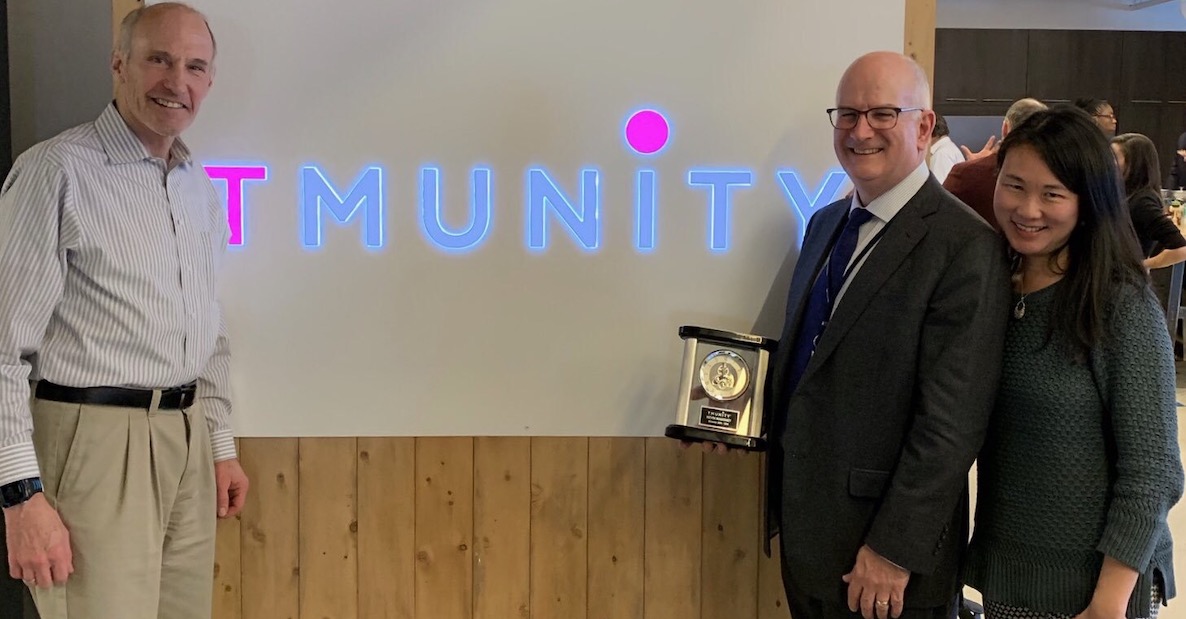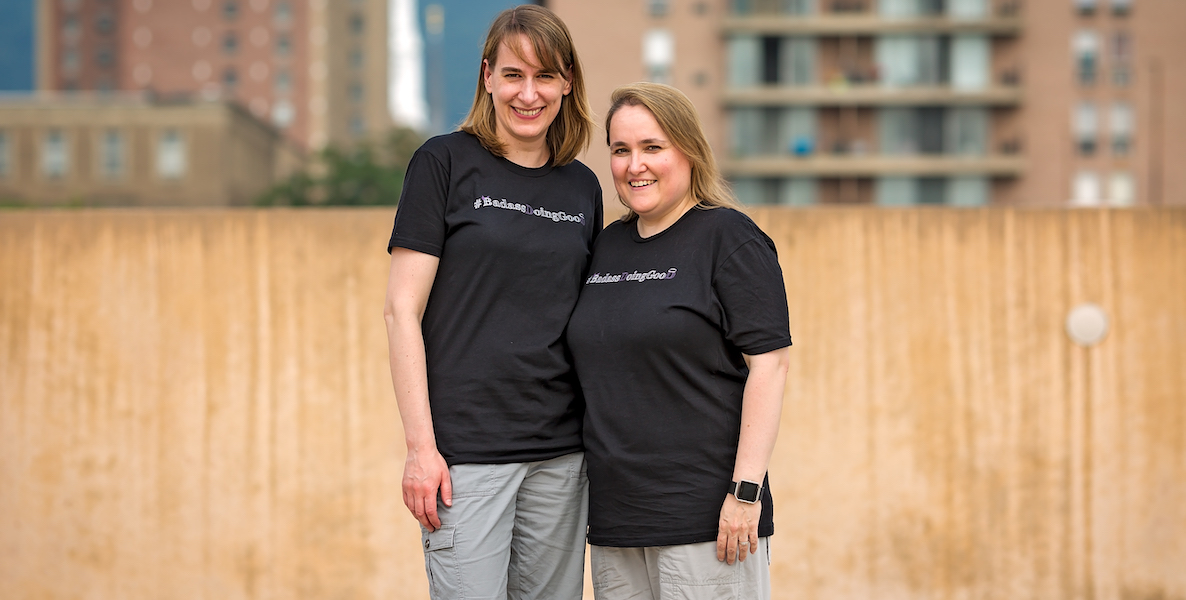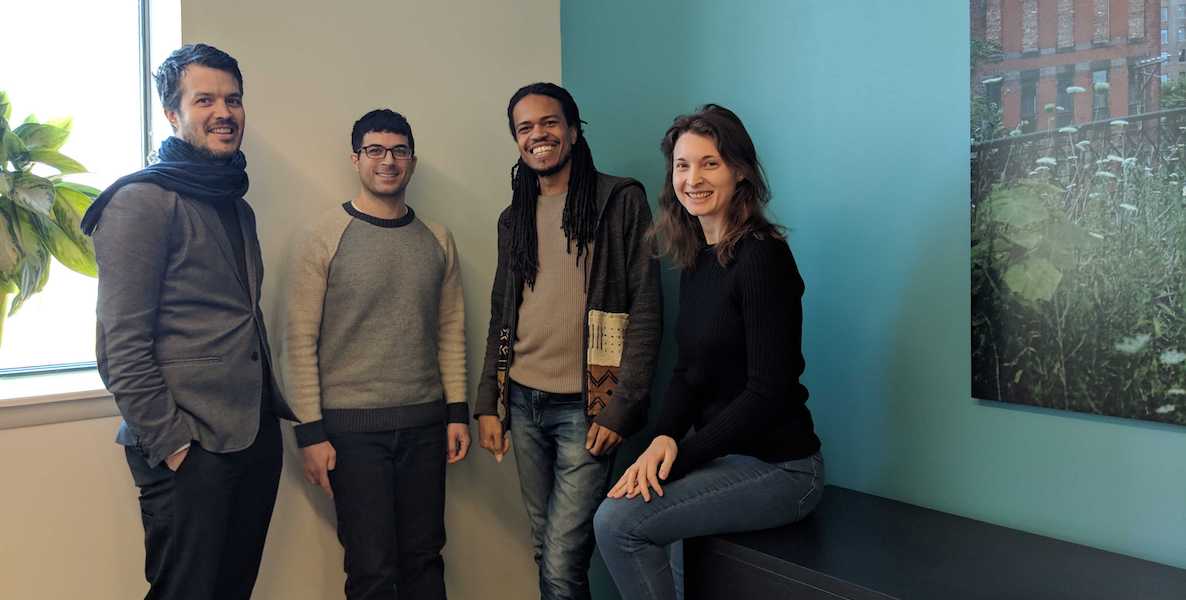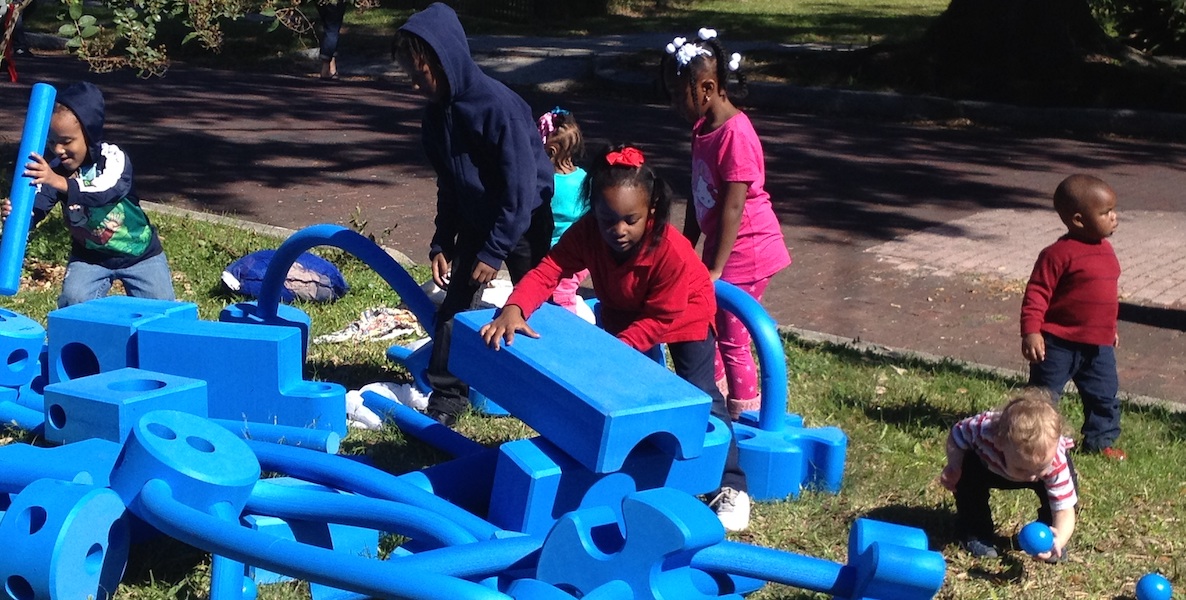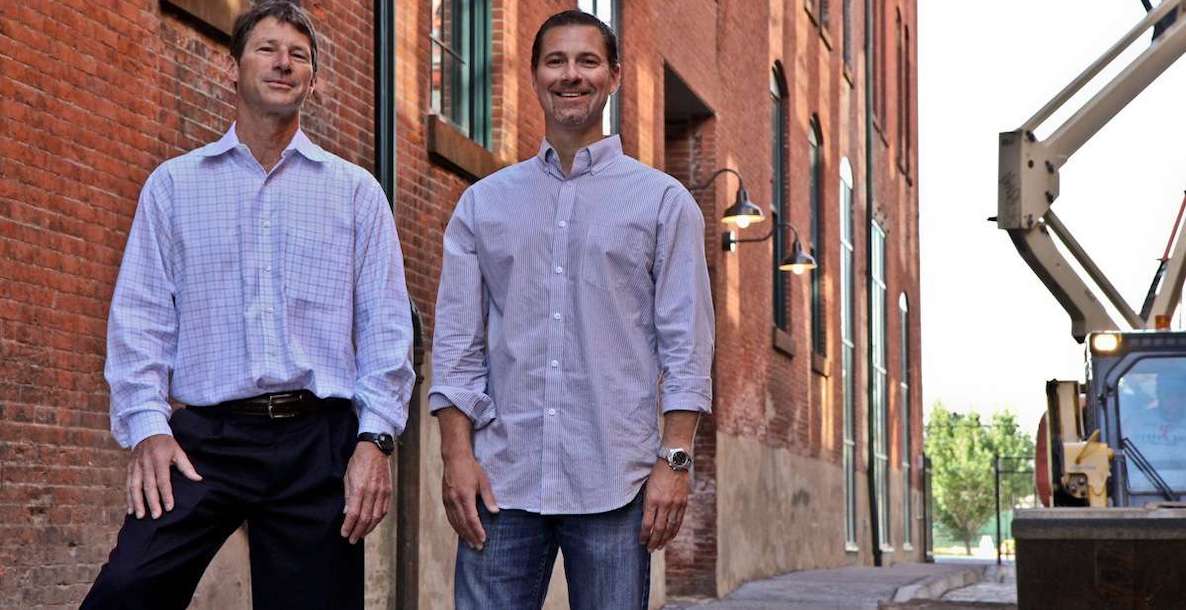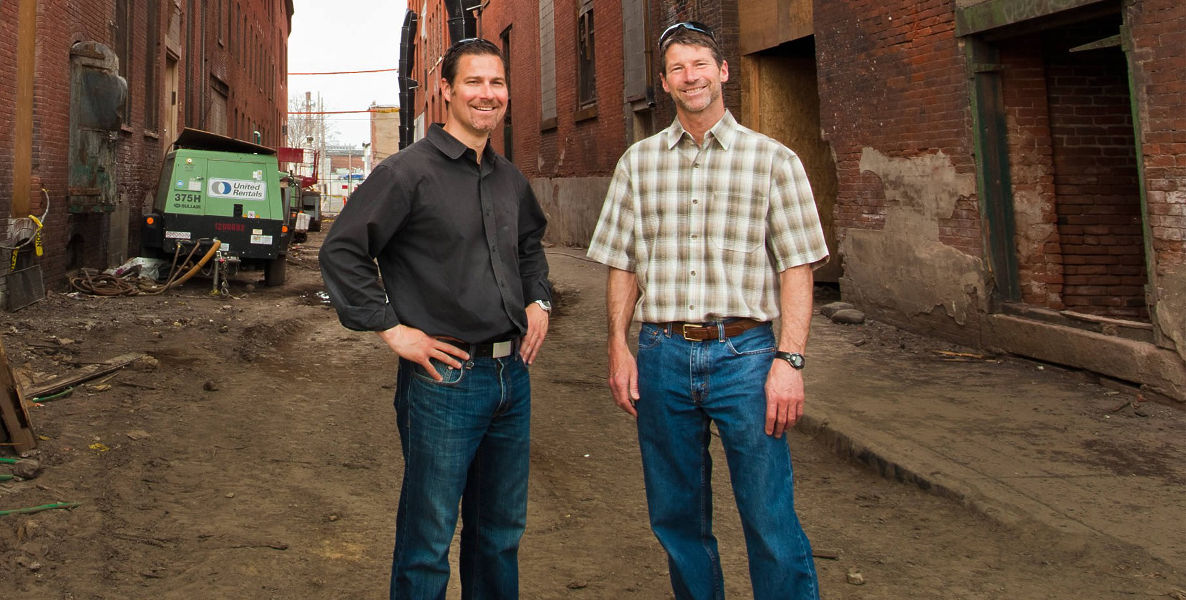It’s not every day that you witness a grown man delighting in puddles of mud.
But such is the case as Greg Hill excitedly strides into the hosed-down construction site at the intersection of Huntingdon Street and Trenton Avenue where he, along with his equally hands-on business partner, Gabe Canuso, are due to open Huntingdon Mills, a follow-up to their successful Oxford Mills development a few blocks south in Fishtown.
When The Citizen first checked in with the civic-minded duo behind the firm D3 Developers in 2015, Oxford Mills had just opened as a mixed-use living and commercial space for education-oriented nonprofits and teachers, with teachers occupying 60 percent of the 114 rental units and paying 25 percent less than market-rate for their rent.
Now, D3 is set to duplicate the model, albeit on a smaller scale, this time with an eye towards the health and wellness community. Whereas at Oxford Mills the commercial tenants include Teach for America and ArtWell (among others), Huntingdon Mills—which is scheduled to open in November—will have as its anchor tenant the offices and an early learning center for CORA Services, which provides support and resources for nearly 20,000 children and families in Philly.
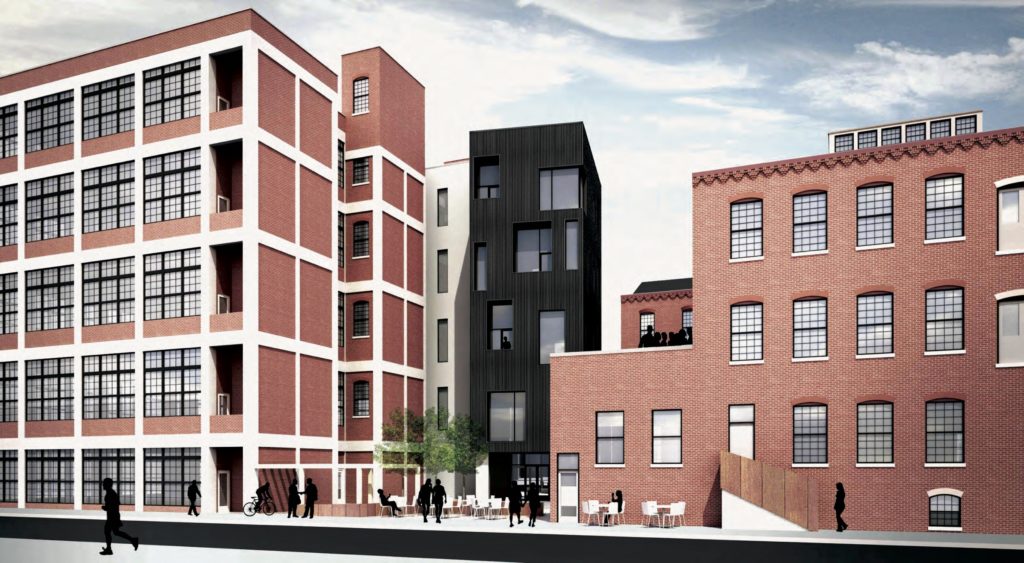
And where teachers make up 60 percent of residential tenants at Oxford Mills, 100 percent of Huntingdon Mills’ 39 units will be reserved for social workers and others in the wellness space, whose rent will also be discounted by 25 percent. “From the day that we opened Oxford Mills, we started to see the mission unfold in the way we wanted it to for education, and we kept saying to ourselves ‘What other community can we benefit? What’s the next step?’ And we kept coming back to the health and human services,” Canuso explains.
“Everywhere we turn, there are exceptional people doing exceptional things every day,” Canuso says. “The benefits that I’ve gotten out of knowing them has enhanced my life 10 times over.”
With Canuso chairing the board of Children’s Crisis Treatment Center and Hill’s wife a director there, both men are deeply connected to and passionate about the world of social work and behavioral health issues. “Social workers are doing the hardest work you could ever do and not being paid particularly well, and dealing with the challenges of how to get affordable housing,” Hill says. “There’s no doubt that people in the behavioral health and social services certainly could use the same type of boost that we were able to provide to teachers at Oxford Mills.”
![]()
Oxford Mills—where there’s a steady waitlist of dozens of potential tenants—is modeled on a successful project in Baltimore, and came with intertwined intentions: to entice and retain Philly teachers; to attract mission-driven commercial tenants; and to fuel a sense of community in the rapidly changing neighborhood. As the property approaches its five-year anniversary this June, Hill and Canuso’s expectations have been met—and exceeded.Tenants regularly utilize the building’s communal indoor and outdoor spaces for events, organize brown-bag lunch discussion series, and attend classes and workshops in the free-for-tenants conference rooms.
“It means a lot for our organization to be in a beautiful place with mission-based developers,” says Susan Teegen, founder and executive director of ArtWell, a nonprofit that brings art programs to Philly schools. In the past, Teegen says, her organization would have had to shell out hundreds of dollars to rent a space for, say, a drum circle—but now that money can go back into programming. “We feel like we’re in a place of shared values,” Teegan adds. “Having all of these amenities has made a huge difference.”
“We like seeing this city be a better place, and by aligning ourselves with other good people, it becomes very rewarding,” says Hill. “I think it sort of plays to who we are.”
Hill and Canuso came to their altruistic mission after years spent working on high-end residential projects—like building and selling condos in Washington Square. When the recession hit, that business all but died. In the wake of what seemed like disaster, the men pivoted towards projects that serve a social good. It has proven lucrative in ways that matter more than the bottom line.
“We like seeing this city be a better place, and by aligning ourselves with other good people, not just on the building side, but with the nonprofits that we’re working with, it becomes very rewarding,” says Hill. “I think it sort of plays to who we are.”
![]()
Assuming Huntingdon Mills is as well-received as Oxford Mills, the possibility of continuing to replicate the concept in Philly is limited only by the availability of real estate which, Hill says, is getting harder and harder to come by. On top of that, the New Market Tax Credit, which has awarded more than $1 billion to businesses and revitalization projects in low-income areas in Philly and on which D3 has relied heavily to get projects off the ground, is getting more competitive. Lending institutions are also creating more challenging loan terms.
![]()
Those hurdles aren’t enough to dissuade the do-good duo, though. They see potential in West Philly, in particular, and remain driven by the prospect of improving the city. They also recognize the unique factors that make Philly ideal for these kinds of projects: a surfeit of industrial buildings eligible for historic tax credits, large pockets of need—and people trying to fill those needs who themselves need housing.
“Everywhere we turn, there are exceptional people doing exceptional things every day,” Canuso says, from the top floor of the Huntingdon Mills site, taking in the 360-degree views of the city before him, while Hill chats warmly with the construction workers on site. Right now, the building is still a shell of the carpet factory it once was, but through the glimmer in their eyes, you can sense all that it has the potential to be. “Maybe we’re providing a benefit to them,” Canuso says, “But the benefits that I’ve gotten out of knowing them or collaborating with them or seeing how they work and what they’re doing for the community has enhanced my life 10 times over.”
Photo via D3 Developers


